Brent Marchant's Blog, page 84
January 19, 2019
‘On the Basis of Sex’ levels the playing field
‟On the Basis of Sexˮ (2018). Cast: Felicity Jones, Armie Hammer, Justin Theroux, Sam Waterston, Kathy Bates, Cailee Spaeny, Jack Reynor, Stephen Root, Chris Mulkey, Gary Werntz, Francis Xavier McCarthy, Ben Carlson, Angela Galuppo, Callum Shoniker, Holly Gauthier-Frankel, Moira Wylie, Lily Mitchell, Violet Mitchell. Director: Mimi Leder. Screenplay: Daniel Stiepelman. Web site. Trailer.
Patently unfair circumstances ultimately hurt everyone. Allowing the perpetuation of double standards harms those who are innately disadvantaged, but the damage seldom stops there; at some point, those who seemingly benefit from those arrangements can ironically be undone by them, their advantages wiped out by a fate that they likely view with incredulity as some kind of weird, unfathomable joke. Which is why everyone is better off with a level playing field, one in which we each get an equal shot at available opportunities with no arbitrarily imposed constraints holding us back. However, bringing such conditions into existence may prove challenging and time-consuming, especially for those on the outside looking in. And that’s where the role of the fervent advocate comes into play, one whose story is detailed in the inspiring new biopic, “On the Basis of Sex.”
Anyone seeking to build a career – of virtually any type – in 1950s America had to face a fundamental truth: For better or worse, it was indisputably a man’s world. That may have been a sweet deal for men, but it seriously frustrated women looking to earn college degrees and enter the professional work force. What’s more, these circumstances often had the force of law behind them; legally sanctioned discrimination on the basis of sex was a fact of life, one that reinforced a view that men were the breadwinners and women stayed home to raise children and run their households, an outlook widely considered “the natural order of things.” Needless to say, breaking out of this mold was a tall order for any woman who wanted more than a conventional lifestyle.

Harvard law student Ruth Bader Ginsburg (Felicity Jones, standing) seeks to make a name for herself in what has traditionally been a profession for men only as seen in the inspiring new biopic, “On the Basis of Sex.” Photo by Jonathan Wenk, courtesy of Focus Features.
This was the world that Harvard University law student Ruth Bader Ginsburg (Felicity Jones) faced as she began her pursuit of a legal career. She looked forward to the opportunity to prove her worth and live up to her potential. But, despite the impressive credentials that enabled her acceptance into this prestigious program, Ginsburg and her female colleagues routinely faced openly antagonistic discrimination toward them. This included chiding from Dean Erwin Griswold (Sam Waterston), who outwardly challenged the women to justify why they deserved slots in law school that he sincerely believed rightly belonged to men. Such gender-based prejudice rankled Ginsburg to no end, so much so that it pushed her that much harder to excel.
But, in spite of her efforts to focus on her studies and career advancement, Ginsburg found herself having to take on a more traditional role when her husband, Martin (Armie Hammer), a law student one year ahead of her, was diagnosed with testicular cancer. Suddenly the young wife and mother found herself having to care for an ill husband, along with her toddler daughter, Jane (Lily Mitchell, Violet Mitchell), while attending to her coursework, as well as aiding Martin in completing his studies. It was quite a full plate, but a steadfast Ruth was determined to succeed.
Thankfully, Martin was cured of his illness, graduating on schedule with a job awaiting him as a tax attorney at a New York law firm. But, with Ruth still having a year of school remaining, to avoid being separated from her husband while finishing up, she completed her education at Columbia University, from which she graduated first in her class. However, even with such a formidable academic pedigree to her credit, Ginsburg faced more frustration when she sought to secure a position with any number of New York law firms. For all of her accomplishments, potential employers simply couldn’t bring themselves to hire a woman, including those that readily recognized her talents. Even Martin’s enthusiastic recommendations went ignored. The legally sanctioned sex-based discrimination that held back so many women did the same to Ginsburg, despite her abilities and accomplishments.

Tax attorney Martin Ginsburg (Armie Hammer, left) encourages his wife, Ruth (Felicity Jones, right), a passionate advocate for eliminating legally sanctioned gender-based discrimination, to take on an unlikely case to make her point, an inspiring fact-based story brought to life in director Mimi Leder’s “On the Basis of Sex.” Photo by Jonathan Wenk, courtesy of Focus Features.
Given her lack of success in securing work with the New York firms, as a “fallback,” Ruth reluctantly took a position as a professor at the Rutgers University law school, teaching civil procedure with an emphasis on the discriminatory aspects of the legal code. She was less than enthusiastic about having to “settle” for this position. She would have preferred to serve as a full-time practicing attorney, as well as an advocate for equal protections for women under the law, a cause championed by one of her idols, pioneering lawyer Dorothy Kenyon (Kathy Bates). Little did Ginsburg know, however, that this position would be the springboard to her greatest accomplishments.
After years of teaching at Rutgers, much of it spent with quiet regret that she was not living up to her aspirations, Ruth got the break she was waiting for. Martin came upon a case that he suggested she should take on, one that could change everything, both for her personally, as well as for the cause of eliminating legal prejudice on the basis of sex. It was an unusual case, one rooted in tax law (not one of her specialties) but one that also had gender-based discrimination written all over it.
In essence, the case involved an instance where a male plaintiff (Chris Mulkey) was denied a tax benefit that was otherwise readily available to women. The strategy involved here was to argue that discrimination based on sex fundamentally violates the Equal Protection Clause of the U.S. Constitution, hurting both men and women, regardless of gender. If she could convince the court to rule in her favor, it would set a precedent that could open the door to potentially knocking down all of the other laws on the books that legally sanctioned discrimination on the basis of sex.

Working with American Civil Liberties Union colleague Mel Wulf (Justin Theroux, left), activist attorney and law professor Ruth Bader Ginsburg (Felicity Jones, right) takes on a court case with the potential to set a precedent for eliminating legally sanctioned gender-based discrimination in the inspiring new biopic, “On the Basis of Sex.” Photo by Jonathan Wenk, courtesy of Focus Features.
While preparing for the case, Ginsburg began to see the profound impact of what a victory would mean. The implications would not only change the law, but would also potentially help to change the culture, something that could be a major benefit to an upcoming generation of women, like Ruth’s now-teenage daughter (Cailee Spaeny), a feisty idealist cut from the same cloth as her mother. Because of this, Ginsburg could see the tremendous weight she was placing on her own shoulders. But, if successful, she could also envision the tremendous influence a favorable ruling would have in reshaping the country and setting it on a new path for the future.
Working with longtime colleague Mel Wulf (Justin Theroux) of the American Civil Liberties Union, as well as husband Martin, who would argue the tax aspects of the case, Ruth went to court to take up the cause. And, just to make things even more interesting, opposing her in court would be a team led by attorney Jim Bozarth (Jack Reynor) backed by one of her old foes, Dean Griswold (who had now become Solicitor General of the United States), and one of her former Harvard law professors (Stephen Root), who recognized though was reluctant to acknowledge her abilities. The showdown was thus set, with a lot riding on the outcome.
This film, a dramatized account of incidents described in the documentary “RBG” released earlier in 2018, shows what it means to passionately advocate for change but doing so in a well-reasoned manner, one that evokes results that ultimately make much possible through small, measured steps. What’s more, it demonstrates how it’s possible to fundamentally change the nature of something as sweeping as a nation’s culture by means that convincingly persuade and don’t call for browbeating others into submission. Thankfully, we have brave souls like Ruth Bader Ginsburg at the helm to help make such changes possible. And, given her success in the wake of these efforts, eventually becoming associate justice of the U.S. Supreme Court, it’s obvious her impact has been considerable.

Seeking advice from pioneering rights attorney Dorothy Kenyon (Kathy Bates, right), law professor and would-be litigator Ruth Bader Ginsburg (Felicity Jones, left) seeks to take on a landmark case that she hopes will inspire a new generation of women, such as her teenage daughter, Jane (Cailee Spaeny, center), as depicted in the new fact-based drama, “On the Basis of Sex.” Photo by Jonathan Wenk, courtesy of Focus Features.
In looking back on Ginsburg’s life and career, we see a visionary who has tenaciously fought to bring her outlook into being. This is directly attributable to her beliefs, the cornerstone of the conscious creation process, the philosophy that maintains we manifest the reality we experience through the power of our thoughts, beliefs and intents. It’s not clear whether she had ever heard of this concept, but she obviously made (and continues to make) effective use of its principles.
For starters, Ginsburg possessed an unshakable faith in her beliefs regarding fair and fundamental equality, given that it was written directly into the Constitution itself. Because of that provision, any form of legalized discrimination was, in her view, a direct violation of the parent document. Nevertheless, due to widely held culture-based notions about “the natural order of things,” those concepts crept into the law and became established, despite what the Constitution said. To Ginsburg, this was unacceptable.
Therefore, to bring about change, Ginsburg believed that both the culture and the law needed to be amended to produce the desired results. This necessitated the introduction of reformers (like her) into the system that drew up the rules so that the rules could be amended. This began with her entrance into law school (still quite a rarity at the time) and becoming part of what had traditionally been an all-male sanctuary. And then, once on the inside, she had an opportunity to start implementing plans aimed at instituting change. As the film indicates, this was an uphill battle, to be sure, but, considering her tenacity, she was not about to give up, despite the obstacles.
Fortunately, she had the foresight to realize that the system could not be changed overnight; given the longstanding traditions involved, it simply wouldn’t happen that fast. However, by laying a solid, precedential foundation, the groundwork could be put into place to make it possible to steadily chip away at the laws that discriminated based on gender. Those statutes simply could not withstand the challenges against them in the face of prior decisions that maintained such arbitrary distinctions were unfair and illegal. As society became used to these changes, Ginsburg’s belief in the viability of such a gradually unfolding scenario proved valid, bringing about the change she sought, both in the law and, ultimately, the culture.
The beliefs employed in this process were ingeniously devised. To begin with, they mowed down established limitations, exposing their inherent weaknesses and pushing them aside in favor of a new view. But a big part of why they worked had to do with the fact that they arose out of a blending of intellect and intuition, the two elements that feed into belief formation. On an intuitive level, Ginsburg and her supporters knew their outlook was intrinsically more fair than the status quo. And the method by which they ultimately sought to implement it was brilliantly reasoned out, drawing upon the logic that drives the intellect. By fusing these intuitive and intellectual elements, Ginsburg came up with the perfect marriage of influences to formulate her manifesting beliefs.
Taking such a stand, however, was anything by a mainstream position at the time. Even though we may take these views for granted now, they were still generally considered fringe notions when she made her case. Arguing for them took great courage, moving past whatever fears and apprehensions she might have had and living heroically, quite a feat for a woman facing a judiciary and legal opposition that was solidly all male. But, armed with the power and conviction of her beliefs, Ginsburg had formidable weapons at her disposal, something that obviously stood her in good stead.
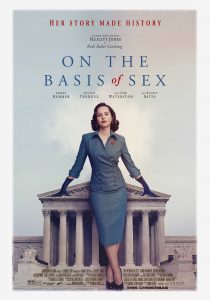
The impact of her beliefs and actions has been, to say the least, immensely impressive. She established a legacy that has carried on to this day, summoning up legions of followers to carry on the work she began. And, as noted before, this army of advocates has changed the way the culture addresses these issues, no longer looking at them through outmoded blinders based on passé subjective traditions but rooting them firmly in fundamental fairness and equality. Now that’s quite a creation.
This somewhat formulaic but nevertheless inspiring biopic about the early days of Ginsburg’s career is one of those feel-good offerings that has natural audience appeal. With fine, underrated performances by Jones and Bates, the film capably walks viewers through the complexities of the litigious landscape without resorting to excessive legalese while simultaneously putting a human face on the central issues in question, both in the lives of the protagonist and those for whom she served as advocate. To be sure, the pacing sometimes gets bogged down, and the screenplay tends to unfold in a safe, tried-and-true, somewhat predictable manner. Nevertheless, the inspiration “On the Basis of Sex” affords and the ideas it champions are well worth the play they get here, something that should prove uplifting to those who seek fairness, equal opportunity and even-handedness in all of their endeavors. It’s particularly appropriate for impressionable young minds, such as those of an upcoming generation of women looking to make their mark on the world – and the culture at large.
But, then, that’s what heroic figures make possible when they take on their causes. They trap those who would hold others back by using their opponents’ own weapons against them, a clever strategy that frequently leaves them holding all the cards while their vanquished adversaries cower in utter defeat. They set an example not only for their followers to embrace, but that also fundamentally changes the attitudes of those who try to stifle them. Ruth Bader Ginsburg is one of those iconic figures who did just that, opening new doors – and new vistas – for both her immediate constituency as well as everyone else. She has spent decades showing us what it means to play fair – and the rewards that such noble conduct is ultimately capable of bestowing on us all.
Copyright © 2019, by Brent Marchant. All rights reserved.
The post ‘On the Basis of Sex’ levels the playing field appeared first on Brent Marchant.
January 16, 2019
This Week in Movies with Meaning
Reviews of “Mary Poppins Returns,” “On the Basis of Sex” and “Shoplifters” are all in the latest Movies with Meaning post on the web site of The Good Media Network, available by clicking here.
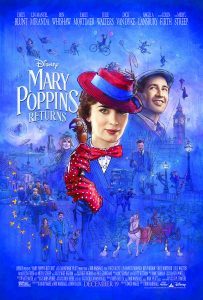



The post This Week in Movies with Meaning appeared first on Brent Marchant.
January 14, 2019
The Cinema Scribe Is on the Move!
Tune in for the latest Cinema Scribe segment on Bring Me 2 Life Radio at a new day and time, Tuesday January 15 at 2 pm ET, available by clicking here. And, if you don’t hear it live, catch it later on demand!


The post The Cinema Scribe Is on the Move! appeared first on Brent Marchant.
‘Shoplifters’ redefines the nature of family
‟Shopliftersˮ (‟Manbiki kazokuˮ) (2018). Cast: Lily Franky, Sakura Andô, Maya Matsuoka, Jyo Kairi, Miya Sasaki, Kirin Kiki. Director: Hirokazu Koreada. Screenplay: Hirokazu Kore-eda. Story: Hirokazu Kore-eda. Web site. Trailer.
What makes a family? Some would say it’s strictly a matter of blood relations. Others would contend that it’s based on emotional bonds, the kind that form through birth, adoption or matrimony. But others still might claim that such considerations are irrelevant, that being a family stems from other less common and less tangible but nevertheless significant connections, ties that keep everyone together for everyone’s benefit. These are questions raised and explored in the unusual new Japanese comedy-drama, “Shoplifters” (‟Manbiki kazokuˮ).
Making ends meet in modern-day Tokyo can be difficult, as the Shibata family would readily attest. Everyone has to contribute, but even those combined efforts barely keep the family off the streets. As the principal breadwinner, father Osamu (Lily Franky) provides as best he can by working as a day laborer on construction sites. Meanwhile, mother Nobuyo (Sakura Andô) tries to earn her keep by pressing clothes in a commercial laundry. Then there’s sister Aki (Maya Matsuoka), who contributes her share through the money she clears working at a “hostess club.” Together they share a meager residence with the family matriarch, Grandma Hatsue (Kirin Kiki), and her adolescent grandson, Shota (Jyo Kairi).

The Shibata family (clockwise from top left, Sakura Andô, Miya Sasaki, Maya Matsuoka, Kirin Kiki, Lily Franky, Jyo Kairi) struggles to make ends meet in modern-day Tokyo in director Hirokazu Kore-eda’s latest offering, “Shoplifters” (‟Manbiki kazokuˮ). Photo courtesy of Magnolia Pictures.
But, even for all their efforts, the Shibatas merely scrape by, living in a ramshackle inner city home in a rundown neighborhood. So, to stay afloat, they supplement their respective incomes through a questionable and unconventional means – shoplifting.
As the leader of this petty crime ring, Osamu has the practice down to an art. Working with Shota, the crafty team routinely succeeds at clandestinely swiping much of what they want and need from a variety of unsuspecting shop owners. Nobuyo, meanwhile, has become an expert at rifling through the clothes that come into the laundry, skillfully finding – and taking – whatever items of value that unsuspecting customers may have inadvertently left in their pockets. Even Grandma Hatsue gets in on the game by running a grifting scam in which she effectively – and routinely – uses guilt to fleece a young married couple for cash. Everyone has an angle, it seems, but their combined efforts all play a part in helping to sustain the household.
The Shibatas’ “shoplifting” is elevated to an entirely new level, however, one cold evening as Osamu and Shota return from one of their latest orchestrated heists. While walking through the back alleys on their way home, they find a young girl, Yuri (Miya Sasaki), alone on the street. The shivering, malnourished child appears to have been abandoned, and she offers little information about her circumstances other than the fact that she comes from a home in which her parents spend a lot of time engaged in heated arguments. Unsure how to return Yuri to her family (and whether they even should), Osamu and Shota take her in.

The shoplifting duo of Osamu Shibata (Lily Franky, left) and son Shota (Jyo Kairi, right) demonstrate their expertise at ripping off shop owners for all kinds of goods in the new Japanese comedy-drama, “Shoplifters” (‟Manbiki kazokuˮ). Photo courtesy of Magnolia Pictures.
This act of compassion is met with somewhat mixed feelings when the small-time crooks return home. Clearly everyone can see that the child is in need of help, but, at the same time, Yuri’s also quietly looked upon as yet another mouth to feed in an impoverished household where resources are already stretched thin. The family nevertheless agrees to take her in, at least temporarily, but, with little to go on regarding the whereabouts of Yuri’s parents, that arrangement soon becomes permanent. And, after a time, the Shibatas come to warmly welcome the newest member of the tribe, though Osamu and Nobuyo frequently look over their shoulders in apprehension, worried that, if found out, they might be accused of kidnapping.
In no time, Yuri settles in with her new family. But joining her adoptive relatives comes at a cost – literally. So, to help her earn her keep, before long, she’s taught how to participate in the Shibatas’ supplemental income program. She becomes a valued participant in the shoplifting scams organized by Osamu and Shota. And she proves to be a natural at it, quickly learning the ropes and becoming proficient in the art of successfully ripping off retailers. Yuri makes it look easy, all the while artfully maintaining the appearance of supreme innocence. She fits right in.

Family matriarch Grandma Hatsue (Kirin Kiki) comes up with a clever scheme to make money to help support her family in “Shoplifters” (‟Manbiki kazokuˮ). Photo courtesy of Magnolia Pictures.
However, given how the family struggles to get by, one can’t help but wonder how long they’ll be able to keep getting away with their tricks without getting caught. Even they grow quietly concerned, especially since the stakes are now higher with Yuri in their midst, a secret that, if discovered, could land them in jail. It’s a threat that’s always with them. So, when one of their scams goes awry, it opens an enormous can of worms, not just to the caper of the moment, but also to a host of other secrets whose implications for the family’s future are staggering. What was thought to be a ring of petty thieves actually turns out to be something much more nefarious (at least in the eyes of the law). The Shibatas may see themselves as a family merely living an alternate type of existence, but authorities come to view them as something else entirely.
When faced with such trying circumstances, it takes some creativity to survive, and the Shibatas have become adept at devising alternative solutions. That’s because they’re willing to think outside of accepted conventions and push past limitations, abilities made possible by their committed belief that such outcomes are indeed attainable. This is a hallmark principle of the conscious creation process, the philosophy that maintains we manifest the reality we experience through the power of our thoughts, beliefs and intents.
Even if the Shibatas have never heard of this concept, they’re clearly practiced at making use of its principles. They’re able to envision what they seek to achieve and then come up with the means to make it happen. This usually calls upon them to consider options that are far from typical, but they’re routinely rewarded for their creative thinking, receiving the inspiration they need and ultimately attaining the hoped-for results. And, as becomes apparent through the film, this applies to more than just how they meet their basic material requirements; it has applications in a wide range of areas, including some that clearly fulfill the family’s emotional needs.

Doting parents Nobuyo (Sakura Andô, left) and Osamu (Lily Franky, right) spoil the latest addition to their family, their adoptive daughter, Yuri (Miya Sasaki, center), after finding the abandoned child on the streets of Tokyo in director Hirokazu Kore-eda’s “Shoplifters” (‟Manbiki kazokuˮ). Photo courtesy of Magnolia Pictures.
Of course, if the Shibatas are so clever at drumming up these inventive solutions, one can’t help but wonder why they don’t use their beliefs to create more favorable conditions in the first place, an existence free of the hardships they deal with on a daily basis. That’s a legitimate question, but perhaps there are other, less obvious considerations involved here, such as learning particular life lessons. For example, even though shoplifting and grifting help the family cover their basic needs, such actions are generally viewed as unethical and immoral, not to mention illegal. Can poverty be used to justify criminality? Admittedly, it’s an expedient solution, but what of the risk and responsibility? What message does such activity send to the younger members of the family? Are there options available that would help the family escape its conditions that don’t rely on such dubious tactics?
Those well versed in conscious creation realize that beliefs can be used to resolve such conundrums. However, doing so takes some innovative thinking that pushes the envelope a little more than what has been employed thus far. The answers may not be as convenient or expedient, but there’s a good chance they might be legitimate, helping the family avoid the potential liabilities associated with their current beliefs and actions.
Despite these problematic circumstances, one area in which the Shibatas have succeeded is in building a loving and mutually supportive family. Such an undertaking can be difficult under conditions as daunting as what they face, but they know they have one another to count on, and that kind of bond can help them weather adversity surprisingly well. They know the true meaning of family, and there’s a lot to be said for that.

After what is a sometimes painfully slow first hour, “Shoplifters” manages to redeem itself in its second half, with heart-tugging moments and stunning revelations that evoke genuine emotions without becoming sentimental or manipulative. While the film’s first half contains subtle hints of what’s to come in its back end, the pacing of the opening act, unfortunately, tends toward tedium at times. As with many of his other pictures, director Hirokazu Kore-eda tells a story that occasionally feels like it wasn’t fully fleshed out at the time it was filmed, despite an intriguing premise and an array of ideas for insightful exploration. It’s truly regrettable that the picture lacks the consistency it needs to make it a better offering overall.
Despite these shortcomings, however, “Shoplifters” has been showered with praise at film festivals and in awards competitions over the past year. Early in 2018, the picture captured the Cannes Films Festival’s Palme d’Or, the event’s highest honor. Later in the year, the film was named one of the National Board of Review’s top five foreign language offerings. And since then it has earned nominations in the foreign film categories of the Independent Spirit Awards and the BAFTA Awards. It received comparable nods in the Golden Globe and Critics Choice Award competitions, but those nominations failed to translate into wins.
Those who face life from a different perspective than those in mainstream society frequently must contend with conditions and challenges that others don’t have to address. The need for support in those circumstances thus becomes crucial, yet, in many cases, it’s also often harder to come by. That’s where the need to manifest one’s own customized circle of kindreds comes into play, and the importance of succeeding at this can’t be emphasized enough, as one’s very survival may depend on it. But, in doing so, we must consider the questions of responsibility and consequences that accompany such efforts, for they’ll determine how well we get by – and who we rightly get to call family.
Copyright © 2018-19, by Brent Marchant. All rights reserved.
The post ‘Shoplifters’ redefines the nature of family appeared first on Brent Marchant.
January 10, 2019
‘Mary Poppins’ affirms the power of magic
“Mary Poppins Returns” (2018). Cast: Emily Blunt, Lin-Manuel Miranda, Ben Whishaw, Emily Mortimer, Colin Firth, Julie Walters, Meryl Streep, Dick Van Dyke, Angela Lansbury, David Warner, Pixie Davies, Nathanael Saleh, Joel Dawson, Jeremy Swift, Kobna Holdbrook-Smith, Jim Norton, Noma Dumezweni, Tarik Frimpong, Suda Bhuchar, Steve Nicolson, Christian Dixon, Chris O’Dowd (voice), Edward Hibbert (voice). Director: Rob Marshall. Screenplay: David Magee. Story: David Magee, Rob Marshall and John DeLuca. Source Material: P.L. Travers. Web site. Trailer.
Children frequently delight in the power of magic. They appreciate the wonder it engenders, and they often look on in wide-eyed awe at what it can produce. But, somewhere along the line, many of us lose that sense of amazement as we age, believing that such notions are little more than foolish, childish fantasies. What’s worse, due to the difficulties of prevailing circumstances in many of our lives, some of us may never discover the joys of this endearing aspect of life to begin with, denying us one of the tremendous pleasures of childhood. And, unfortunately, in either case, we often end up divorced from the skills and mindset that a genuine belief in magic affords us, separated from valuable tools that can help us achieve happiness and fulfillment in life. When this happens, we need something to help us discover or rediscover what we’ve lost or never found, the kind of fun-filled intervention offered by a specially gifted miracle worker in the long-awaited sequel to a Disney musical classic, “Mary Poppins Returns.”

Times are tough in Depression Era London, and even those who were once relatively well off are experiencing the financial pinch of “the Great Slump.” So it is for the family of Michael Banks (Ben Whishaw), a middle-aged aspiring artist and temporary bank employee who struggles to make ends meet for himself and his three children, Annabel (Pixie Davies), John (Nathanael Saleh) and Georgie (Joel Dawson). But monetary worries are the least of his troubles; he’s also wrestling with the grief of the recent loss of his wife, as well as the chaos of living in a home that’s gradually becoming run down. He gets some help from his housekeeper, Ellen (Julie Walters), and his social activist sister, Jane (Emily Mortimer), but the ever-growing list of challenges weighs heavily on him.
If all that weren’t bad enough, though, an even bigger setback occurs when the bank holding the mortgage on Michael’s home announces that it’s about to foreclose on the property. The beleaguered Mr. Banks has less than a week to make good on his delinquent payments or risk losing the house. To cope with this, Michael and Jane appeal their case to Mr. Wilkins (Colin Firth), the chairman of the bank, who appears to sympathize with their plight but doesn’t offer any particularly special accommodations, despite the longstanding relationship that he and the institution have with the family (three generations of Bankses have been employed by the organization).

Wondrous and whimsical nanny Mary Poppins (Emily Blunt) makes a return engagement to a family in need of her own special brand of help as seen in the long-awaited sequel to the 1964 Disney classic, “Mary Poppins Returns.” Photo by Jay Maidment © 2018 Disney Enterprises, Inc.
Needless to say, these challenges make for pretty glum conditions in the Banks household. As world-weary adults, Michael and Jane have lost much of the happy-go-lucky spunk that they relished when growing up. And the children, who, by their own initiative, have commendably stepped up to take on more responsibilities, are nevertheless missing out on many of the joys of youth that all kids should be allowed to experience. Something clearly needs to be done to turn things around, but, considering what the family is up against, it’s obvious that a miracle is what’s really needed.
Enter Mary Poppins (Emily Blunt), the whimsical, wondrous nanny who helped raise Michael and Jane. She arrives out of the blue, apparently not having aged a day in 30 years, to help with the upbringing of a new generation of Banks children, as well as to help Michael and Jane recover some of the joy that they once had but have since lost. Together with an old friend, Jack (Lin-Manuel Miranda), a kindly lamplighter, her eccentric cousin, Topsy (Meryl Streep), and an assortment of colorful live and animated cohorts, Mary introduces Annabel, John and Georgie to an array of extraordinary experiences that provide them with fun times and a host of valuable and practical life lessons. At the same time, Mary helps her former charges rediscover what they had forgotten, easing their burdens and restoring their faith in the magic that makes life worth living.

Wondrous and whimsical nanny Mary Poppins (Emily Blunt, left) provides her own brand of wit, wisdom and child-rearing skills to the lives of the Banks children, Annabel (Pixie Davies, second from left), John (Nathanael Saleh, second from right) and Georgie (Joel Dawson, right), in “Mary Poppins Returns.” Photo by Jay Maidment © 2018 Disney Enterprises, Inc.
While Mary has retained many of the charms she possessed from her previous go-round (as seen in this film’s predecessor, “Mary Poppins” (1964)), there are some new subtle differences in her character. For instance, given the hardships of the 1930s and the challenges the Banks family faces, Mary is more of a “realist” this time out, recognizing the seriousness of the circumstances and bringing a practical attitude along with her, one focused on solving problems yet never losing sight of the quaintness, eccentricity and creativity that helped to distinguish her personality, outlooks and methods. What’s more, Mary is also a bit “saucier” this time, a bearing more reflective of the times (and the sensibilities of contemporary movie audiences) and less unrealistically saccharine encrusted. The result is a Mary Poppins who’s readily recognizable but more in step with the times during which the story is set (and for the time that the film is being released).
What hasn’t changed is Mary’s fondness for working her magic through song. In a series of skillfully orchestrated musical numbers involving singing, dancing and animation, Mary, Jack, the children and an assortment of kindreds including everyone from Topsy to a kindly balloon lady (Angela Lansbury) joyfully convey their messages and work their magic for the benefit of one another as well as those watching from the audience. (It’s good to see that some things don’t change.)
The messages that come through are valuable ones, too, especially for impressionable young minds and those who can use a fresh new perspective. In virtually every instance, Mary and company stress the magic attainable in life – provided we allow it. Outcomes like that may seem unlikely to some but wholly plausible to others. The difference lies with one’s beliefs, the cornerstone of the conscious creation process, the philosophy that maintains we use those metaphysical building blocks to manifest the reality we experience. And, even though Miss Poppins may not use the term “conscious creation” to describe what she professes, the intent behind this philosophy and her teachings are essentially identical.

Jack (Lin-Manuel Miranda), a kindly London lamplighter, helps out an old friend, a wondrous and whimsical nanny, in director Rob Marshall’s “Mary Poppins Returns.” Photo by Jay Maidment © 2018 Disney Enterprises, Inc.
On a number of occasions during the film, Mary makes it plain that anything is possible as long as we believe in the outcome. To accomplish such ends, she encourages us to take such steps as adopting new perspectives, envisioning what we want, breaking through limitations that hold us back, and confidently and playfully facing our fears. All of these principles are core elements of Mary’s personal point of view, but they’re also key concepts for making conscious creation work.
Inherent in all of the foregoing notions is the idea that we’re each innately responsible for what we create – and that it’s up to us to come up with the solutions we need to resolve our challenges. Unfortunately, this is a crucial life lesson that many of us have tried to disavow (with varying degrees of success) or that we may have never learned in the first place, leaving us without an important coping skill for navigating our way through our existence. In light of that, then, it’s heartening to see a picture that encourages its viewers – especially young ones – to embrace these concepts. The messages may come dressed up in a pretty, colorful package, but the information they impart is undeniably important, lessons that will undoubtedly prove useful on our respective journeys (and the sooner we learn them, the more ingrained they’ll likely become as part of our mindset for life). Way to go, Mary!

Aspiring middle-aged artist Michael Banks (Ben Whishaw, right) and his social activist sister, Jane (Emily Mortimer, center), plead for leniency on the pending foreclosure of the family home from the chairman of the bank holding the mortgage, Mr. Wilkins (Colin Firth, left), in the long-awaited sequel to the 1964 Disney classic, “Mary Poppins Returns.” Photo by Jay Maidment © 2018 Disney Enterprises, Inc.
In the interest of full disclosure, I was skeptical about this one and wasn’t particularly looking forward to seeing it. I must admit, however, that I enjoyed it much more than I was expecting, especially since remaking classics or creating sequels to them is very risky business (and something that often makes me cringe). This offering does justice to the original, thanks to its excellent production values and many fine performances. Its enjoyable soundtrack isn’t quite as memorable as its predecessor, but, unlike many contemporary musicals, it’s far from forgettable. Emily Blunt pays perfect homage to the legendary character and is worthy of whatever acclaim that comes her way, and kudos are definitely due its fine cast of supporting players. The film is, unfortunately, somewhat episodic, using the sometimes-thin narrative between musical numbers mostly as a bridge to link the songs to one another. Otherwise, though, this is a capably made and surprisingly delightful release.
Though critical acclaim for this film has been a little soft, the picture has nevertheless fared well in awards competitions. Both the National Board of Review and the American Film Institute have named “Mary Poppins Returns” as one of their top 10 films of 2018. In the recently announced Golden Globe Awards competition, the picture picked up four nominations, including best comedy picture, best comedy actress (Blunt), best comedy actor (Miranda) and best score, though it took home no statues. In the upcoming Screen Actors Guild Awards, Blunt earned a nomination for best leading female, and, in the BAFTA Awards contest (the British equivalent of the Oscars), the picture has captured three nominations for original score, costume design and production design. The film’s greatest haul of nominations, though, has come in the Critics Choice Awards program, earning nine nods, including best picture, actress, actress in a comedy, score, visual effects, production design and costume design, as well as two nominations for original song.

Topsy (Meryl Streep), the eccentric cousin of a nanny known for working her own brand of magic, helps others get a new view on life (and vice versa) in the whimsical new musical comedy, “Mary Poppins Returns.” Photo by Jay Maidment © 2018 Disney Enterprises, Inc.
Finding satisfaction in life can often be challenging enough in itself, but, without a belief in the power of magic, one of the forces than can help to bring it about, the process can be that much more problematic. Thus it’s in our best interest to keep sight of this force for good and cultivate it whenever we can. Considering the alternative, it’s really not too much to ask of ourselves; indeed, we truly have nothing to lose and everything to gain. The magical Mary Poppins reminds us of this, and, if we know what’s good for us, we had better listen to her.
Copyright © 2019, by Brent Marchant. All rights reserved.
The post ‘Mary Poppins’ affirms the power of magic appeared first on Brent Marchant.
January 9, 2019
‘Beale Street’ celebrates the power of love, community
“If Beale Street Could Talkˮ (2018). Cast: KiKi Layne, Stephan James, Regina King, Colman Domingo, Diego Luna, Dave Franco, Finn Wittrock, Emily Rios, Brian Tyree Henry, Michael Beach, Aunjanue Ellis, Teyonah Parris, Ebony Obsidian, Dominique Thorne, Ed Skrein, Ethan Barrett, Milanni Mines, Pedro Pascal, Marcia Jean Kurtz, Kaden Byrd. Director: Barry Jenkins. Screenplay: Barry Jenkins. Book: James Baldwin, If Beale Street Could Talk. Web site. Trailer.
Much goes on in a neighborhood that comes to define its character. It’s as if the community takes on a life and personality of its own, one that frequently persists and comes to distinguish the area in question, including its residents, often for generation after generation. It’s a phenomenon that essentially becomes a way of life for all concerned, a circumstance examined in the moving new screen drama, “If Beale Street Could Talk.”
As the film opens, a cinematic epigraph references Beale Street in New Orleans, a place where writer James Baldwin, author of the book on which this picture is based, contends that every Black person born in America comes from, even those who don’t call the Big Easy home. Baldwin says there’s a version of Beale Street, the birthplace of Louis Armstrong and jazz, in every urban African-American neighborhood, a place from which the community at large has its collective roots. It’s a noisy place, one with an array of qualities, including the love of family and the ugliness of injustice. And it’s just such a place that provides the backdrop of this story, in this case the iteration found in New York City’s Harlem in the 1970s.

Childhood friends and adult lovers Fonny Hunt (Stephan James, left) and Tish Rivers (KiKi Layne, right) face an uncertain future together in director Barry Jenkins’s latest offering, “If Beale Street Could Talk.” Photo by Tatum Mangus/Annapurna Pictures © 2018 Annapurna Releasing, LLC.
Nineteen-year-old Tish Rivers (KiKi Layne) and 22-year-old Alonzo “Fonny” Hunt (Stephan James) have known each other since childhood. Having grown up as friends and playmates, they have since come to be lovers as they enter young adulthood. The connection between them is undeniable, as if they were destined to be together. And, for the most part, their bond is supported by their families, who have also been acquainted with one another for years. Tish’s parents, Sharon (Regina King) and Joseph (Colman Domingo), and her older sister, Ernestine (Teyonah Parris), adore Fonny and are so pleased that their daughter and sibling has found such a genuinely good man to love. However, the Hunts don’t share that enthusiasm; while Fonny’s dad (and Joseph’s drinking buddy), Frank (Michael Beach), likes Tish, the same can’t be said for his mother (Aunjanue Ellis) and sisters (Ebony Obsidian, Dominique Thorne). They look upon Tish with disparagement and condescension, a belief that she’s not good enough for their son and brother. And the gap between them is about to widen as Tish prepares to reveal some big news about herself and Fonny.
Tish’s big announcement is that she’s carrying Fonny’s child, a revelation that utterly appalls Mrs. Hunt. As a self-proclaimed (supposedly) good Christian woman, she’s revolted by the news, especially given that Tish and Fonny aren’t married. She berates the mother of her grandchild for her “sin,” even going so far as to say that she hopes the child is never born. But her scorn doesn’t stop there; she also chastises Tish for being the source of all the trouble that has befallen Fonny of late, including blaming her for his incarceration for a crime he didn’t commit. Tish and her family know that Fonny has been wrongly jailed, and they’re working tirelessly to help secure his release with the assistance of a lawyer (Finn Wittrock) seeking to overturn the erroneous racially motivated charges. But, as these circumstances quickly reveal, the only meaningful help Tish and her family will get from the Hunts will come from Frank, who angrily lashes out at his wife’s tactless and hypocritical behavior.
Faced with the prospect of having to raise a child as a single mother, at least for now, Tish does her best to carry on. She continues to work at her job as a cosmetics salesgirl in an upscale department store to earn money to cover living expenses and legal bills. She regularly visits Fonny in jail in an attempt to lift his spirits while he awaits trial. And she and her family routinely meet with Fonny’s lawyer to coordinate strategy on how to get his case thrown out. It’s a full plate for someone who has a new life steadily – and rather actively – growing inside her.
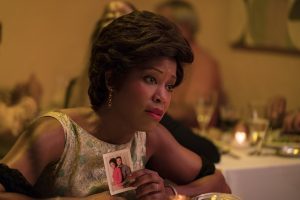
Concerned mother Sharon Rivers (Regina King) does her best to help out her daughter and son-in-law-to-be in the screen adaptation of author James Baldwin’s “If Beale Street Could Talk.” Photo by Tatum Mangus/Annapurna Pictures © 2018 Annapurna Releasing, LLC.
Despite hopes for the best, it gradually becomes apparent that securing Fonny’s release may be more difficult than thought. His alibi is likely to be looked upon as suspect, given that it involved spending time in the company of his old friend, Daniel Carty (Brian Tyree Henry), who had himself just been released from prison. To complicate matters, the arresting officer (Ed Skrein) turns out to be someone with whom Fonny had had a previous (and rather contentious) encounter, one that clearly revealed his obvious racial prejudice. And, on top of all that, the victim who made the accusations (Emily Rios) – which included serious charges involving rape and other depraved atrocities – has fled New York, disappearing to her native Puerto Rico. With these elements working against Tish and Fonny, the prospects of his release before the birth of his child – and possibly even at all – grow progressively dim. Sadly, even the love that runs through their families and permeates the version of Beale Street where they grew up and live may not be enough to overcome the injustice that also resides there. One can only hope that it’s enough to sustain all concerned as they work through their respective trials and tribulations and look forward to the hope of a brighter future.
The rollercoaster of emotions that is “Beale Street” examines what it means to address both life’s joys and its challenges. Through its depiction of the love of a family, it shows what makes life worth living. At the same time, though, it also shines a bright light on the ugliness and unfairness that can unduly unravel the happiness we would all like to enjoy. But, perhaps most importantly, it aptly depicts the resilience of the human spirit to deal with such trying conditions, that the love that brings us into being can help to sustain us through our hardships and, one would hope, help us find a way to carry on and make the best of things. That’s certainly difficult for characters like Tish and Fonny, but, when one sees the depth of the bond that joins them, it’s obvious they’ll figure out a way to move forward, no matter what may befall them.
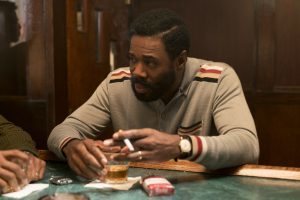
Hard-working father Joseph Rivers (Colman Domingo) goes to the wall to help out his troubled daughter and future son-in-law in the dramatic new release, “If Beale Street Could Talk.” Photo by Tatum Mangus/Annapurna Pictures © 2018 Annapurna Releasing, LLC.
Carrying on under such circumstances can benefit tremendously from an outlook built on convictions that give the protagonists hope, a result that’s possible thanks to the conscious creation process, the philosophy that maintains we manifest the reality we experience through the power of our thoughts, beliefs and intents. It’s unclear whether Tish, Fonny and their families are aware of this philosophy, but, based on how their story unfolds, it’s apparent that they know how to make use of it.
For example, the love that binds Tish and Fonny, as well as Tish’s parents and the members of her family, is truly palpable, an outcome that’s a direct outgrowth of their belief and faith in the concept. That’s important, too, given the strength it provides in helping them address their respective challenges. It enables them to face their fears and emboldens them with the mutual support they need to get by. Indeed, those are potent forces whose benefits should never be underestimated when it comes to the formation and establishment of our beliefs.
When this notion is applied on a wider scale, such as to an entire community that intentionally seeks to collectively hang tough in the face of adversity, we witness the power of co-creation come into being. And, considering what the principals here – and the residents of all the nation’s Beale Streets – are up against, employing this notion can prove invaluable.

Former inmate Daniel Carty (Brian Tyree Henry, right) addresses the hardships of incarceration in “If Beale Street Could Talk.” Photo by Tatum Mangus/Annapurna Pictures © 2018 Annapurna Releasing, LLC.
Of course, if conscious creation can be used to manifest whatever we want, then one might legitimately ask, “Why would anyone use it to materialize the kinds of difficulties that the characters are experiencing here?” As I have written before, this contention has merit, but, as I’ve also stated, the reasons behind why we create what we create are highly individual matters, choices that we’re not meant to question given that they’re designed to fulfill personal purposes. But, that said, one might yet wonder, “What kinds of personal purposes could possibly be served by circumstances like these?”
In many cases, the challenges we manifest for ourselves are intended to address particular life lessons, even those that many of us would consider essentially negative. Such situations, daunting though they may be, are part of our personal growth and development, providing us access to all aspects of life and what it means to be human.
In other instances, circumstances like those faced by Fonny – and many similarly situated peers, I might add – are often meant to draw attention to such plights, injustices in serious need of correction. A similar case can be made for the harsh, judgmental treatment that Mrs. Hunt inflicts upon Tish when she learns of her pregnancy, a proclamation that draws the ire of Sharon and Frank, both of whom don’t hesitate to make their feelings known about such a close-minded attitude. These “protest” manifestations are often difficult to endure, but, once the unfairness and hypocrisy associated with them are recognized, they frequently spur on much-needed reforms.
Creations that might cause us to scratch our heads thus do serve a purpose, but it requires us to look beneath the surface and examine the beliefs that brought these materializations into being. Once we understand the reasoning, we might well look at these situations in an entirely new light, one that fundamentally changes prevailing opinions. And that’s where the impact of co-creation comes back into play, particularly when it’s fueled by beliefs driven by noble sentiments, the power of love and the strength of the collective. With such conditions in force, it might be possible to change the nature of the neighborhood – and make Beale Street an even better place to live.

Rape victim Victoria Rogers (Emily Rios) flees bad memories of New York and heads home to her native Puerto Rico, making life difficult for a wrongly accused inmate in director Barry Jenkins’s “If Beale Street Could Talk.” Photo by Tatum Mangus/Annapurna Pictures © 2018 Annapurna Releasing, LLC.
In making the first James Baldwin novel ever to be adapted for the big screen in the author’s native voice, writer/director Barry Jenkins has undertaken quite a task with this venture. That’s quite a tall order, too, given that it’s coming on the heels of the filmmaker’s much acclaimed Oscar-winning masterpiece “Moonlight” (2016), itself a formidable accomplishment. And, in many regards, this offering shines on many levels, coming close to matching its lavishly praised predecessor. With fine performances, beautiful cinematography, genuinely evocative emotion, a sumptuous background score and a skillfully crafted ambiance, “If Beale Street Could Talk” effectively draws viewers into the world of 1970s Harlem, one characterized by a mix of heartfelt love and ugly injustice. However, despite its many attributes, the film is somewhat bogged down by excessively lingering imagery and protracted dialogue that both go on a little too long, needlessly slowing the narrative’s pace. Some of that comes with the territory in a picture that’s driven more by character development than plot, but what’s presented here still could have used some tightening up. What’s more, in an attempt to avoid being too heavy-handed, the director at times uses a little too much restraint in his storytelling, keeping the picture from having an impact that isn’t as viscerally potent as it could (and should) have been. In all, Jenkins’s offering is a fine effort in many respects, though one that I wish could have been a little better. But, then, considering what Jenkins had to live up to, that would have been quite the challenge for any filmmaker.
Nevertheless, “If Beale Street Could Talk” has been wowing critics and earning numerous accolades in this year’s awards competitions. The picture earned three Golden Globe Award nominations for best dramatic picture, screenplay and King’s supporting actress performance, an honor for which she came up the winner. These accolades came on top of those presented by the National Board of Review, which named the picture one of the year’s top 10 films and bestowed it with awards for best adapted screenplay and King’s portrayal. In upcoming contests, the film is vying for five Critics Choice Awards, including best picture, screenplay, score and cinematography, as well as King’s supporting performance. In addition, the picture is up for best feature, director and supporting actress in the Independent Spirit Awards competition.
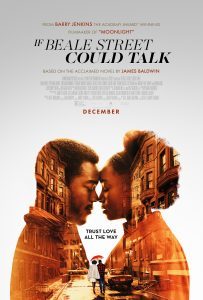
As trite or sentimental as it might seem, the belief that “love will find a way” often turns out to ring true more than not. It’s difficult to see the veracity of this when things get tough, but, when we come through our turmoil and look back on how we turned matters around, we frequently find that this intangible force is what usually gets us back on our feet. If we have faith in it and adhere to our convictions, we just might find that our ordeals can turn around more quickly and smoothly than we thought possible. When faced with significant difficulties, it could be all we have to draw upon. And, if that happens, why not give it a chance? After all, what do we have to lose? If we successfully draw upon it and manage to reverse our circumstances, that would certainly give us – and our own version of Beale Street – a lot to talk about.
Copyright © 2018-19, by Brent Marchant. All rights reserved.
The post ‘Beale Street’ celebrates the power of love, community appeared first on Brent Marchant.
January 8, 2019
This Week in Movies with Meaning
Reviews of “If Beale Street Could Talk” and “Vice,” along with 2018’s 10 best and worst, are all in the latest Movies with Meaning post on the web site of The Good Media Network, available by clicking here.




The post This Week in Movies with Meaning appeared first on Brent Marchant.
January 5, 2019
The Best and Worst of 2018
Another year in filmdom has come and gone, and countless movie reviewers have issued their best and worst lists for 2018. And so, with that said, it’s time to add my voice to the chorus, with my choices for the cream of the crop and the curdled cream best discarded.
In the interest of full disclosure, I must confess that I did not screen every film that was released in 2018, most notably those that were distributed through limited or select channels or have yet to go into wide release, such as a number of foreign films and a few lesser-known independent productions, like “Stan & Ollie.” However, I did spend considerable time staring at those flickering lights on the big screen during 2018, enough to make me feel comfortable in offering up my selections for the pictures that I believe represented the best and worst of past 12 months. Documentaries are treated separately from fictional releases, and links to complete reviews of some of these films are included where applicable.
As always, I’d love to hear your feedback in the comments section (be civil, please). And with that, here goes:
THE TOP 10
10. “If Beale Street Could Talk”

Director Barry Jenkins’s follow-up to his Oscar-winning masterpiece “Moonlight” (2016) comes close to matching its predecessor in many respects, though it doesn’t quite equal its forerunner. With fine performances, beautiful cinematography, genuinely evocative emotion and a skillfully crafted ambiance, “If Beale Street Could Talk” effectively draws viewers into the world of an African-American family whose lives are characterized by heartfelt love but subjected to ugly injustice. However, despite these many attributes, the film is somewhat bogged down by excessively lingering imagery and protracted dialogue that both go on a little too long, needlessly slowing the narrative’s pace. What’s more, in an attempt to avoid being too heavy-handed, the director at times uses a little too much restraint in his storytelling, keeping the picture from having an impact as strong as it might have been. In all, this is a fine effort in many regards, though it’s one that I wish could have been a little better. But, considering what it had to live up to, that would have been a tall order for any filmmaker. (Full review to come.)
9. “Mission Impossible: Fallout”

Hands down, this is one of the best action-adventure films to have come along in quite some time. Admittedly, it’s rare for me to give such high marks to films in this genre, but there’s a reason for it this time: The film’s many well-crafted action sequences aren’t the only elements carrying the story in this offering. The flashy chases and stunts are effectively balanced by an engaging narrative that, despite a few plot holes, provides a riveting tale full of twists, turns and misdirections. This is a franchise that just seems to be getting better with time. Fasten your seat belts, folks!
8. “Ben Is Back”
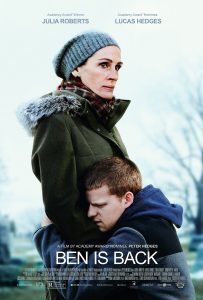
Why this film is being ignored (and, in some cases, unfairly bashed) surprises me to no end. “Ben Is Back” features a well-integrated fusion of family drama and crime thriller set in the world of drug addiction. Julia Roberts and Lucas Hedges turn in knock-out performances worthy of awards consideration for their range of emotion and powerful delivery, and the film’s smartly written screenplay serves up an excellent mix of heartfelt emotion, gritty intensity, shocking revelation, pointed comic relief and deftly nuanced subtlety. Sadly, this appears to be one of those releases that’s simply going to be ignored for honors and accolades, and that’s truly unfortunate, as this is quite an unexpected gem.
7. “Eighth Grade”

Despite a slight tendency toward being episodic, this insightful look at an awkward time in one’s life at an unnerving time in history wins the day with incisive humor and an ever-present though reluctantly acknowledged edginess that speaks plainly to viewers of any age. Newcomer Elsie Fisher, a Golden Globe Award nominee, delivers a phenomenal performance, backed by a terrific ensemble of supporting characters who help to bring out the best in her portrayal. The summertime release provided some welcome fresh air to a movie market dominated by action-adventure and animated releases, but “Eighth Grade” actually makes a fine viewing selection for any time of year.
6. “ A Private War”

Although a little weak on back story, this gripping biopic about journalist Marie Colvin’s dogged determination to get out the wartime stories not otherwise being told sizzles with bold intensity, especially in its uncompromising depictions of the horrors she witnessed firsthand and the personal toll such events took on her physically and emotionally. Rosamund Pike’s stellar, Golden Globe-nominated performance as the intrepid war correspondent is certainly award-worthy, showing the many sides of a complex character who frequently straddled the line between bravery and recklessness. Be forewarned, however, that the graphic nature of “A Private War” makes it a questionable choice for sensitive and squeamish viewers. But, for those who like their heroic tales larger than life and rooted in truth, this one is definitely for you.
5. “Can You Ever Forgive Me?”

As biopics go, “Can You Ever Forgive Me?” is about as good as they get. This engaging, superbly written tale about a literary scoundrel and her scheming sidekick delivers a banquet of laughs and tears with a dash of inspired larceny, all wrapped up in an intelligent cinematic package. Melissa McCarthy delivers a stellar performance as talented but unsuccessful author Lee Israel, who resorts to forging literary letters as a means to support herself when book sales falter. Aided by scalliwag Richard E. Grant, this unlikely duo stumbles their way through a minefield of high-brow crime, seeking to get away with inspired but flawed acts of fraud against potential victims who are ultimately smarter than the would-be ingenious crooks. It’s nice to see a picture that refuses to dumb itself down to appeal to the lowest common denominator, serving up good fun, heartfelt emotions and a delicious twist on crime tales all rolled into one.
4. “The Favourite”

This wickedly dark, smug period piece comedy is sure to leave viewers routinely agasp at its outrageous humor, which marvelously mixes understatement with in-your-face bawdiness. The trio of protagonists brilliantly portrayed by Olivia Colman, Emma Stone and Rachel Weisz, all of whom have been repeatedly lauded for their performances, never disappoints, with each at the top of their game. The film’s smartly written script is crisp and snappy throughout, even if it takes liberties with history and occasionally falls back on director Yorgos Lanthimos’s signature penchant for needless ambiguity. Not everyone will go for “The Favourite,” but, if you can imagine a mix of the cattiest moments from Dynasty dressed up in 18th Century trappings, you’ve got an idea what this one is all about.
3. “First Reformed”
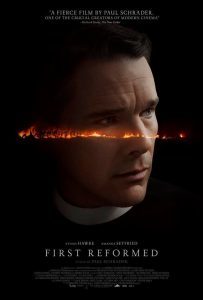
This utterly captivating examination of faith, despair, the search for happiness, and the need to strike a balance between our spiritual and secular lives is far from routine fare. Even though some elements are a little dragged out, much of “First Reformed” sizzles with an underlying intensity that you can feel as the story unfolds. With what is undoubtedly Ethan Hawke’s best screen performance (though one that is being regrettably overlooked), a surprisingly strong portrayal by Cedric “the Entertainer” Kyles in a serious role and phenomenal cinematography, writer-director Paul Schrader has put together a film that gives us all much to contemplate, as well as emotional impressions that will stay with us long after we leave the theater. Handily one of the best – and most undiscovered – releases of 2018.
2. “Green Book”

This superb, fact-based road trip buddy film features two of the unlikeliest of travel companions, an African-American pianist and his New York Italian driver on a concert tour of the American South in 1962. “Green Book” hits all the right notes without belaboring its message while effectively capturing the unusual friendship that grows between the film’s two protagonists. The excellent award-nominated performances of Viggo Mortensen and Mahershala Ali are punctuated by a script that’s full of laughs, poignancy and heart. Think of this one as this year’s edition of “Hidden Figures” (2016), and you have an idea of what it’s all about
1. “Annihilation”

This mind-blowing, sophisticated sci-fi/smart horror tale is, by far, the most overlooked film of 2018. Masterfully brought to the screen by director Alex Garland, who has upped his game considerably from the success of his previous work, “Ex Machina” (2015), “Annihilation” delivers a story that works on multiple levels. The film’s richly layered, deftly nuanced, insightful script, combined with gorgeous cinematography and an inventive production design, make for riveting viewing. It’s unfortunate that this offering had the bad luck to be released at the time when everyone was preoccupied with “Black Panther” and “Avengers: Infinity War,” but, thankfully, it has begun to find an audience through home viewing options. Note, however, that this is not a picture to be watched casually or when one is easily distracted. But an attentive screening is sure to captivate, providing much to think about in terms of metaphysics, spirituality, existence and evolution – and possibly forever changing one’s views on these heady subjects. What’s more, I should add that it’s almost unheard of for me to give such high praise to a film in this genre, so, for me to do so, that’s truly saying something. If you haven’t viewed this one yet, see it – and on as big a video screen as you can find.
Honorable Mentions (in no particular order)
“Mary Poppins Returns” (full review to come)
Noteworthy (in no particular order)
“Deadpool 2”
“On the Basis of Sex” (full review to come)
TOP DOCUMENTARIES
5. “Love, Gilda”

A loving tribute to an immense talent – and one who broke through many personal and professional barriers – who became a huge sensation and who, unfortunately, left us all too soon. With interviews featuring many of her collaborators, a wealth of archive footage and excerpts from her own journals, Gilda Radner comes to life once again, entertaining both those who knew her work and others who are just now discovering it. An account of her story was long overdue, but “Love, Gilda” was well worth the wait.
4. “RBG”
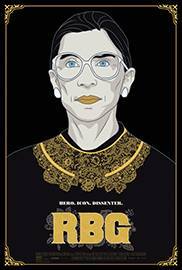
Despite a slight tendency to gush about its subject, this informative, briskly paced documentary presents an in-depth look at the public and private life of Supreme Court Justice Ruth Bader Ginsburg. Through interviews with Ginsburg, life-long friends, family members, peers and the politicians who helped shape her career, as well as a variety of archive footage and audio recordings, “RBG” presents a balanced package of information that both enlightens and entertains. What’s most impressive, though, is the detailed chronicling of the influential (though not-often widely recognized) role that RBG played in the women’s movement, particularly in the area of legally securing equal rights through a series of landmark Supreme Court rulings that she litigated before joining the bench. For those who are unfamiliar with the accomplishments of this remarkable woman, this is must-see viewing.
3. “Won’t You Be My Neighbor?”
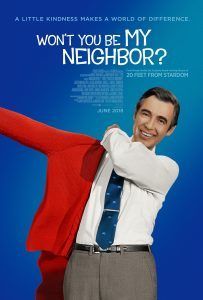
An endearing, moving look at the life and career of a children’s television innovator whose method, approach and message was deceptively profound while being delivered through amazingly simple means. While there’s a slight tendency toward being saccharine encrusted and some slightly sluggish pacing in the first 30 minutes, the overall package of “Won’t You Be My Neighbor?” is delivered with ample humor, remarkable insights and surprising candor. A documentary well worth your time from director Morgan Neville, who’s becoming quite adept at this form of filmmaking.
2. “Filmworker”
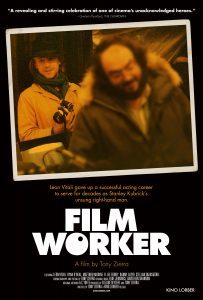
A fascinating look at a fascinating collaboration whose existence is in many ways a mystery but that nevertheless brought about one of the most impressive film repertoires in cinematic history. Leon Vitali may not be a household name, but his contributions to the works of Stanley Kubrick like “The Shining” (1980), “Full Metal Jacket” (1987), “Eyes Wide Shut” (1999) and “Barry Lyndon” (1975), as well as the preservation of such pictures as “Dr. Strangelove” (1964), “2001: A Space Odyssey” (1968) and “A Clockwork Orange” (1971), is incalculable. This riveting documentary attempts to make up for that long-ignored contribution, showing the impact of the man behind the man and a treasure trove of celluloid classics. “Filmworker” is a release with widespread appeal, but it’s one sure to captivate movie buffs and fans of Kubrick’s work.
1. “Three Identical Strangers”

Expect a rollercoaster of emotions from this sometimes-intense, sometimes-heartwarming, sometimes-humorous and sometimes-heartbreaking documentary about the happy reunion of adopted triplets separated at birth and the appalling reasoning behind their separation. This well-researched, meticulously crafted film tells its unbelievable story in great factual detail but in a way that also effectively evokes the emotions it was meant to engender. “Three Identical Strangers” is easily the best documentary of the year and one worthy of awards season accolades.
THE BOTTOM 10
10. “Overlord”

This is a movie that suffers from a major identity crisis: Is it a classic horror flick? A World War II drama? A campy gorefest romp? Well, it’s actually all of these to some extent or another, but the fusion never really meshes as audiences try to guess where this boring, meandering slog is going to go next. From my perspective, it works best as a campy gorefest, something it finally gets around to being about 30 minutes from the end. Had it stuck to this formula throughout, it would have been a much more entertaining picture. As it stands now, though, it doesn’t seem to know what it wants to be, and that, unfortunately, represents a major missed opportunity.
9. “The Happy Prince”

It boggles the mind how a film can take someone as witty and colorful as Oscar Wilde and make the character boring, but that’s precisely what writer/actor/director Rupert Everett has done in this misfire of a biopic. By all rights, the picture is obviously a labor of love for its creator, but, with a focus on Wilde’s last dark days, a needlessly convoluted script that’s all over the map and a noticeable dearth of the snappy banter that made its protagonist famous, the production falls flat and often confuses the viewer with its forward and backward flashes in the action. One of awards season’s – and the year’s – bigger disappointments.
8. “Isle of Dogs”

Director Wes Anderson’s latest continues his practice of creating visually dazzling offerings that are long on style, overlong on story and, ultimately, short on substance. The film’s clever whimsy is cute, warm and funny at times, but it becomes so exactingly overwhelming as the story plays out that it becomes tiresome and exasperating long before the credits roll. What’s more, the film’s clumsily structured narrative and screenplay tell the story in such a disjointed and convoluted way that it’s easy to lose interest, despite the superb stop motion animation eye candy. Meticulously crafted it is; engaging, unfortunately, it isn’t.
7. “Suspiria”

Despite considerable potential, this celluloid mess ultimately can’t pull off what it appears to promise. After a painfully slow and needlessly cryptic start, this stylish horror flick gradually and effectively begins building suspense toward what is believed will be a revelatory and stunning conclusion. Unfortunately, the film falls apart in its final act, going needlessly over the top and ultimately serving up more muddle than resolution, squandering the audience trust that the director had built up in the picture’s preceding segments. Though visually stunning and viscerally affecting, the end product never quite comes together as one would hope, leaving more questions open than answered. While director Luca Guadagnino’s release aspires to cinematic greatness, sadly it ends up yet another exercise in artsy pretentiousness in the same vein as “Mother!” (2017) and “Killing of a Sacred Deer” (2017).
6. “Widows”
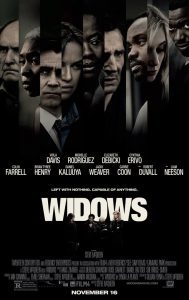
The film’s strong cast aside, “Widows” is a cinematic jumble of too many plots trying to fit into one film, coupled with numerous holes in its story and an overall inherent implausibility that’s impossible to take seriously. While the action sequences are admittedly well orchestrated, they can’t make up for a plethora of other shortcomings that derail this offering from being what it aspires to be. In the end, this is yet another example of a vastly overrated release from vastly overrated director Steve McQueen.
5. “Ready Player One”
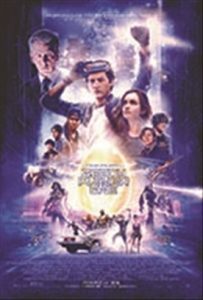
Continuing an unfortunate trend that has come to characterize many of his recent films, director Steven Spielberg’s latest big-budget bloated extravaganza dazzles visually but grows tiresome (some might even say exasperating) rather quickly. The picture plays like a glitzy, nostalgic stroll down an ʼ80s version of memory lane, chock full of nonstop references to the decade’s movies, music and memes (in itself an odd fascination for characters in a story set in 2045). What’s worse, the film lacks a fundamentally compelling story and takes about 45 minutes too long to get to a central message that becomes patently obvious early on in the picture. If you’re looking for purely mindless entertainment, you’ll probably find this moderately amusing, but, if you want something more substantive, skip this one and watch one of the filmmaker’s earlier (and much better) offerings.
4. “Colette”
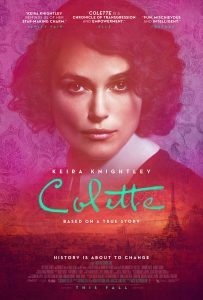
Not even Keira Knightley’s fine performance and excellent period piece production values can save this cartoonish biopic, which plays more like a film adaptation of a tawdry pulp novel than a serious historic saga. This, combined with the characters’ monodimensionality and virtually nonexistent back story, expose a half-baked screenplay in need of major retooling. A genuine disappointment.
3. “The Rider”
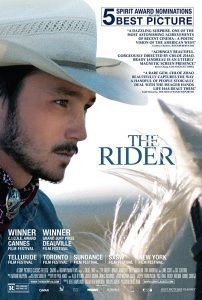
It’s mystifying to me what so many have seen as praiseworthy in this formulaic exercise in utter predictability. This celebration of reckless uber-macho behavior as something noble to which the inner cowboys in all men should aspire is laden with heavy-handed, patently obvious metaphors that even the most casual moviegoer can see coming long before they appear on the screen. Other than some impressive cinematography and a fine lead performance by Brady Jandreau, it’s hard to understand why this otherwise-mediocre offering has garnered so much attention and so many accolades. Maybe my lack of interest in the Western genre is unduly coloring my opinion here, but, with a narrative that’s easy to figure out and a litany of increasingly archaic ideals that are questionable at best, it’s difficult to say anything positive or redeeming about this highly overrated release.
2. “Roma”

OK, I’ll say it – when it comes to this film, the emperor is indeed naked. I’ll admit that the film’s stunning black-and-white cinematography is exquisite and that the scenes introducing the picture’s final act are emotionally mesmerizing (or maybe it’s just that I was glad that something interesting was finally happening on the screen). Unfortunately, those are about the only redeeming qualities this release has to offer. The rest is a big, bloated, underdeveloped bore that tries the patience of even the most tolerant cinephile. It’s obvious this was a heartfelt project for director Alfonso Cuarón, and his personal passion is written all over it. But, given that he’s dealing with uninteresting characters in largely unexplained circumstances in a time frame for which little to no context or back story is provided, he’s not giving the audience much to work with other than a glib implication that essentially says “This is authentic – just trust me on this.” Also, the picture’s anemic attempts at incorporating philosophical and metaphysical themes show the filmmaker’s got some brushing up to do in terms of effectively conveying his meaning in a comprehensible way. If you’re willing to risk the time watching this, be sure to pack a pillow and a lunch.
1. “Don’t Leave Home”
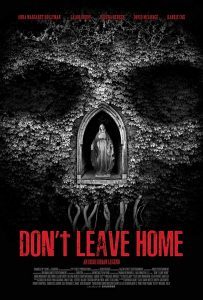
If you’re tempted to see this one, follow the advice given in the film’s title. This atmospheric offering features beautiful cinematography but not much else – a slow, laborious story that continually promises much but delivers little, leaving viewers wondering why they should care about any of this. And, as for the alleged horror angle of this release, I’ve seen scarier breakfast cereal commercials. “Don’t Leave Home”? – don’t waste your time.
Dishonorable Mentions (in no particular order)
“First Man”
“The Bookshop”
“Chappaquiddick”
“Vox Lux”
Got a comment? Please leave one!
Copyright © 2018-19, by Brent Marchant. All rights reserved.
The post The Best and Worst of 2018 appeared first on Brent Marchant.
January 1, 2019
‘Vice’ dissects the unbridled pursuit of power
“Vice” (2018). Cast: Christian Bale, Amy Adams, Steve Carell, Sam Rockwell, Tyler Perry, Alison Pill, Jesse Plemons, Bill Camp, Eddie Marsan, Justin Kirk, LisaGay Hamilton, Don McManus, Lily Rabe, Matthew Jacobs, Kyle S. More, Kirk Bovill, Sam Massaro, John Hillner, William Goldman, Paul Yoo, Joseph Beck, Tony Graham, Alex Kingi, Terri Cavanaugh. Archive Footage: Richard Nixon, Ronald Reagan, Barbara Walters, Tom Brokaw, Mike Pence, Hillary Rodham Clinton, Jeff Sessions, Bill O’Reilly. Director: Adam McKay. Screenplay: Adam McKay. Web site. Trailer.
Power makes much possible. It can be wielded to achieve tremendous, beneficial outcomes. It can also be mangled in contorted ways to fulfill self-serving ends. But, no matter how it’s employed, power comes with consequences of either a positive or negative nature, both individually and collectively. Learning how to manage it to attain desired outcomes while avoiding unintended harm is thus crucial to make the best use of it, a challenge frequently put to the test as seen in the life of an ambitious politician, a story depicted in the new comedy-drama biopic, “Vice.”
In 1963, almost no one would have predicted that slacker Dick Cheney (Christian Bale) would ever amount to anything. The hard-drinking party boy from Wyoming was bounced out of Yale for his excessive boozing and penchant for fighting, behaviors that proved a major disappointment to his honors student girlfriend, Lynne (Amy Adams). In the wake of his unceremonious departure from the halls of the Ivy League, he returned home to take a job as an electrical lineman – and to resume his rowdy ways. And, when those reckless habits got him in trouble again – this time with the authorities – Lynne issued an ultimatum to clean up his act or else.
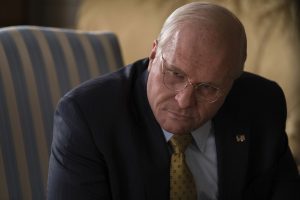
“President” Dick Cheney (Christian Bale) makes big plans to forward his agenda by unconventional means in director Adam McKay’s new biopic, “Vice.” Photo by Matt Kennedy/Annapurna Pictures, © 2018 Annapurna Pictures, LLC.
When faced with the prospect of losing the woman he loved, Cheney opted to settle down. In what many would call a miraculous turnaround, within a few years, he managed to land a position as a Congressional intern in Washington, DC, working in the office of Rep. Donald Rumsfeld (R-IL) (Steve Carell), an egocentric, Barnum-esque House member whose influence was steadily growing. The conservative, eminently demanding Congressman initially looked upon the sheepish new arrival somewhat contemptuously, but, as “Rummy” came to see what the quietly crafty Cheney was capable of, he developed an appreciation for the young apprentice, becoming a mentor and helping him climb the ladder of Washington insiders.
Before long, Cheney’s star quickly ascended. He moved up the ranks of power, joining Rumsfeld in the White House Chief of Staff’s office as his guru’s assistant. And, when Rumsfeld was later appointed Secretary of Defense in the administration of Gerald Ford (Bill Camp), Cheney succeeded his former boss as the President’s right-hand man. He was clearly on the move.
However, after Ford’s defeat in the 1976 presidential election, Cheney was out of a job. Nevertheless, the driven politico was not to be deterred; he used the opportunity to run for Congress as Wyoming’s delegate to the House of Representatives in 1978, a position to which he was elected and held for 10 years. From there he would go on to serve as Secretary of Defense under President George H.W. Bush (John Hillner). And, after a hiatus during which he was CEO of the energy industry multinational Halliburton, he would become Vice President under President George W. Bush (Sam Rockwell), a mere heartbeat away from the highest office of the land.
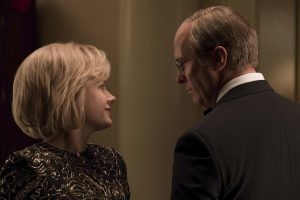
With the advice of his ambitious wife, Lynne (Amy Adams, left), Vice President Dick Cheney (Christian Bale, right) seeks to move up the ladder of power in Washington politics in the new comedy-drama, “Vice.” Photo by Matt Kennedy/Annapurna Pictures, © 2018 Annapurna Pictures, LLC.
Ironically, it was his own heart that would periodically betray him. He suffered five heart attacks between 1978 and 2010, along with other cardiovascular-related health issues. Somehow, though, he managed to keep going, despite the setbacks. Yet, considering the way he typically went about his business, one can’t help but wonder, metaphorically speaking, if the underhanded methods he routinely employed to expand his powers were responsible for taking such a toll on him.
Those underhanded methods were rooted in his skillfully practiced art of manipulation. He was a master at getting his way by tactfully convincing others about the supposed merits of his point of view and making them believe that these ideas were, in fact, their own, enabling them to take credit (or blame) for what they brought about. This was particularly true during his tenure as VP, leading Bush to believe that he was actually calling the shots.

President George W. Bush (Sam Rockwell) runs his office with ideas carefully suggested to him by his second in command in director Adam McKay’s ambitious new biopic, “Vice.” Photo by Matt Kennedy/Annapurna Pictures, © 2018 Annapurna Pictures, LLC.
Cheney’s artful maneuvering, especially when he was second in command, was made possible by a number of tactics based on radical (and some would say questionable) new interpretations of what was considered legally allowable. For instance, Cheney and his lawyer David Addington (Don McManus) contended that, as Vice President, he was essentially answerable to no particular branch of government, leaving him free from oversight. His role as President of the Senate, for instance, separated him from being a member of the executive branch. At the same time, given that he did not actively participate in most Congressional activities, he wasn’t really part of the legislative branch, either. According to this interpretation of his role, such an “unaffiliated” status thus made him a free agent of sorts, allowing him to function largely unencumbered in the cracks between government branches, leaving him more or less unaccountable – and untouchable.
On top of this, Cheney managed to expand the power of the presidency (and, by extension, his own power, given the nature of his standard operating practices) by becoming an ardent advocate of the unitary executive theory. According to this theory, the President possesses the power to essentially rule as he sees fit, almost as if he were a monarch or dictator, enabling the chief executive to function in an almost Machiavellian way. After conferring with legal consultant John Yoo (Paul Yoo), who heartily gave the theory his blessing, Cheney embraced it and went on to convince Bush of its validity, leading the commander in chief to believe that he could take charge and govern according to his own prerogatives. Of course, given how the relationship between Bush and Cheney operated, the ideas that the President put forth were seldom his own, but, with the mandate he believed he possessed, he moved forward to further their implementation. Cheney thus had the means to get his agenda put into place without actually holding the title of chief executive, quite a coup if there ever were one.
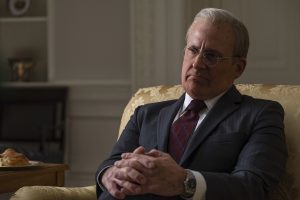
Secretary of Defense Donald Rumsfeld (Steve Carell), once a mentor to Vice President Dick Cheney, proves to be a valuable ally in furthering the VP’s agenda, as seen in the new comedy-drama biopic, “Vice.” Photo by Matt Kennedy/Annapurna Pictures, © 2018 Annapurna Pictures, LLC.
To help cement his position, Cheney surrounded himself with advisors who zealously supported his views and who were effectively capable of countering any opposition put forth by Bush’s counselors. Among Cheney’s cronies were his old pal Rummy (in a return engagement as Secretary of Defense), as well as Rumsfeld’s deputy, Paul Wolfowitz (Eddie Marsan), and the VP’s Chief of Staff, Scooter Libby (Justin Kirk). This formidable front proved useful during controversial discussions, such as those in the run-up to the invasion of Iraq, in which proponents Cheney and company met opposition from skeptics like Secretary of State Colin Powell (Tyler Perry). Those oppositional sentiments, which would later prove true, were squelched by the pile-on tactics of the VP’s posse, backed up by Cheney’s silver-tongued schmoozing to manipulate the commander in chief into embracing their views.
The unbridled ambition – some would say “ruthlessness,” as Rummy called it – were crucial to Cheney’s “success” in pushing and securing the elements of his agenda. And, in line with the principles of the unitary executive theory, he would wield that power when the need called for it. Anyone who got in his way would pay a dear price for challenging him, as was the case with covert CIA operative Valerie Plame, whose identity was intentionally leaked when her husband, Joseph Wilson, publicly blew the whistle on false administration claims about the supposed source of raw materials for Iraq’s alleged weapons of mass destruction.

Secretary of State Colin Powell (Tyler Perry) proves to be a thorn in the side of hawkish elements seeking the launch of the Iraq war, as depicted in director Adam McKay’s “Vice.” Photo by Matt Kennedy/Annapurna Pictures, © 2018 Annapurna Pictures, LLC.
In the end, there was virtually nothing to stop Cheney. Given how he functioned, he fundamentally changed how the executive branch works. And, because of this, he helped orchestrate a foreign policy based on principles that served his geopolitical vision and the goals of American business interests, such as those of his former company Halliburton, which, thanks to no-bid government contracts during and after the Iraq conflict enabled the organization’s stock value to increase by 500 percent. But, in the wake of such developments, one can’t help but ask, are these the principles upon which American democracy was established? And what does that mean for the nation’s future? “Vice” doesn’t directly answer these questions, but it certainly gives us all much to ponder in its wake.
So how did we get to this point? That’s a complicated question, but, if examined in a metaphysical context, we might be able to get a handle on these circumstances. That’s particularly true if we look at them through the lens of conscious creation, the philosophy that maintains we manifest the reality we experience through the power of our thoughts, beliefs and intents. It’s an incredibly powerful means of shaping our destiny, both individually and collectively. And it’s one that carries consequences for those of us who avail ourselves of it – or who disregard its validity and impact.
Based on how he operated, Cheney was a master of the practice, even if he had never heard of it or was aware of its existence. As his story is depicted here, the outcomes he realized clearly resulted from the beliefs he held. For instance, when it came to defining his role as VP in the Bush administration and in clarifying the parameters of executive power, once he had amassed the input he needed to formulate his beliefs, he unhesitatingly embraced those intents to materialize the reality he wanted to see made manifest. He was resolute in his determination and had faith in his convictions, a potent combination for seeing his hoped-for notions come into being.

Deputy Secretary of Defense Paul Wolfowitz (Eddie Marsan) joins the ranks of a formidable political group seeking to steer the presidency of George W. Bush in a particular direction in the new comedy-drama, “Vice.” Photo by Matt Kennedy/Annapurna Pictures, © 2018 Annapurna Pictures, LLC.
Cheney was so thorough in his methods that he figured out how to use his beliefs to create conditions covering all bases. This could be seen through such means as conducting focus groups to determine public opinions about policy issues for determining how to best spin them to the populace. He also believed in controlling the message by massaging the medium through which it was to be disseminated, a reality made possible by funneling carefully crafted information through such select media outlets as Fox News, an opinion-driven cable channel he championed years before it came into being when it was first proposed by his old friend Roger Ailes (Kyle S. More). And, to obtain the legal considerations he required, he actively sought to befriend law professionals like an up-and-coming young attorney named Antonin Scalia (Sam Massaro) who would eventually become a Supreme Court associate justice (Matthew Jacobs). Such a comprehensive approach proved to be a powerful combination to achieve his goals, all brought about by directing his beliefs to create desired manifestations in each of these various areas.
On some level, Cheney had to have been aware of the immense power inherent in this process, and he freely made use of it. Cheney relished this power and unreservedly availed himself of it. And that’s important for all of us to recognize, because it’s crucial to understanding how this practice works. Those who gravitate toward it tend to see their objectives materialize, while those who give their power away are left in the lurch.
That notion is significant in understanding how these conditions arose. While Cheney and his minions willingly embraced the power of conscious creation, many of the rest of us were giving it away, leaving us open to whatever fallout might come our way. Theoretically speaking, one can hardly fault somebody for availing himself of what’s accessible to all of us, even if it’s employed for purposes that many of us would find unacceptable. At the same time, we have no one to blame but ourselves if we fail to follow suit or to counter such practices. And these principles apply in both our individual manifestations and our collective co-creation efforts. In that sense, then, we should probably take this as a cautionary tale to avoid outcomes we’d rather not experience.
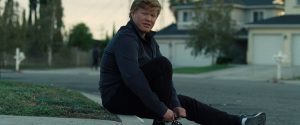
Enigmatic everyman Kurt (Jesse Plemons) provides narration for the story of Vice President Dick Cheney in the new comedy-drama biopic, “Vice.” Photo by Matt Kennedy/Annapurna Pictures, © 2018 Annapurna Pictures, LLC.
However, even those who boldly make use of the process and avail themselves of its power should be clear about what they’re seeking to create, including everything associated with these efforts. Failure to do so could lead to un-conscious creation or creation by default, wherein a focus purely on outcomes with no consideration for consequences can lead to serious deviations of what’s being sought. Serious side effects can lead to disappointments, delays and distortions of our objectives, some of which can be curiously metaphorical. If you doubt that, consider the personally ironic health issues experienced by a practitioner who became so proficient at implementing what could easily be considered “heartless” ways.
But is such a monodimensionally cold, unfeeling depiction of Cheney accurate? After all, as conscious creators generally know, we’re all multidimensional beings made up of many selves and multiple archetypes, and portraying anyone – even Cheney – to the contrary would be patently unfair. So it is through his family life that we see another side of the protagonist, someone who lovingly cared for his wife and daughters, Liz (Lily Rabe) and Mary (Alison Pill). He believed in protecting them and looking after their well-being, so much so that he wouldn’t hesitate to draw the line whenever scrutiny of his home life arose. And he held fast to that view no matter what … except, of course, when political expediency came into play, at which point compromises suddenly became possible. This issue came up, for example, when his daughter Mary’s open homosexuality ran afoul of the conservative values he publicly embraced. He always said he would consider the question of her lifestyle off-limits, but even that position became negotiable when the need arose. It might lead one to observe, “So much for multidimensionality.”
Given Cheney’s portrayal and the depiction of his typical ways of operating, it’s not difficult to imagine that the filmmakers received precious little cooperation from the picture’s subject. There’s even an on-screen statement to that effect at the outset, noting Cheney’s extremely secretive nature and the difficulty associated with obtaining definitive, authoritative information about the life of the VP. That’s where the film’s narrator, an enigmatic everyman named Kurt (Jesse Plemons), comes into play. As someone who claims to know Cheney in a highly unusual but very personal way – a relationship that goes unexplained until a critical juncture in the film – the story presented here in many ways essentially becomes Kurt’s take on Cheney’s life, a personal interpretation that would seem to be borne out by the facts but is not necessarily restricted to them thanks to the “insider” view the narrator provides.

Audiences are thus left to make up their own minds about the veracity and fairness of the depiction presented here, perspectives that are bound to vary widely based on one’s own beliefs about the man and, of course, one’s politics. To be sure, the story has a decidedly left-leaning slant to it, one that’s sure to delight the liberals in the audience but will almost assuredly stoke the ire of right-leaning conservatives. As with anything in conscious creation matters, it’s a question of beliefs. And, interestingly enough, this schism is an issue that, given the current political climate, is just as relevant in evaluating this film as it is in going back and reviewing the historical record it depicts. Even more revealing is how we got to this point and how the protagonist wrangled events in the direction that produced these conditions more than most of us would probably give him “credit” for.
Director Adam McKay’s latest is a capably made film overall, though, admittedly, it’s not as good as I was hoping it would be (and definitely not on par with his previous work, “The Big Short” (2015)). In spite of its excellent performances by Bale, Carell and Rockwell, the production tries to do too much and often gets bogged down in the minutiae of American politics, causing some sequences to become a little snoozy. Also, McKay’s attempts at incorporating cinematic asides of an analogous nature – clever though they may be – don’t work quite as well in this film as they did in his predecessor picture. And then there’s the humor, which only lands about 50 percent of the time, another disappointment. Still, this picture is an insightful look into how Cheney helped orchestrate our current conditions by working the system on multiple fronts, effectively pulling the wool over the eyes of a sleeping public more preoccupied with having its boredom killed than watching out for its best interests. “Vice” thus makes for a potent cautionary tale we should all heed if we hope for matters to improve going forward.
Despite its shortcomings, “Vice” has been widely recognized in awards competitions thus far. The picture has captured six Golden Globe Award nominations, including nods for best comedy, screenplay and director, as well as acting honors for Bale, Adams and Rockwell. In addition, Bale and Adams each earned Screen Actors Guild Award nominations for their respective lead and supporting performances. But the picture came up the biggest winner in the Critics Choice Award contest, taking home nine nominations for best picture, acting ensemble, director, screenplay, editing, and hair and makeup, along with performance honors for Adams and two for Bale (for best actor and best actor in a comedy).
British politician Lord John Acton-Dalberg famously observed that “absolute power corrupts absolutely.” That admonition is perhaps one of the wisest statements ever uttered by someone in a governing position. It’s also one that aspiring leaders need to take to heart if they hope to be of greatest assistance and service to their constituency. One could argue that it was clearly ignored by the protagonist of this film, that it was, in fact, viewed as more of a green light than an insightful caution. We can only hope that those coming up through the ranks learn from it – and from the lessons of this picture – in terms of their leadership philosophies and practices. There’s a lot riding on it – and that’s the absolute truth.
Copyright © 2018-19, by Brent Marchant. All rights reserved.
The post ‘Vice’ dissects the unbridled pursuit of power appeared first on Brent Marchant.
December 20, 2018
‘Ben Is Back’ explores the quest for redemption
“Ben Is Back” (2018). Cast: Julia Roberts, Lucas Hedges, Courtney B. Vance, Kathryn Newton, Tim Guinee, Michael Esper, Rachel Bay Jones, David Zaldivar, Kristin Griffith, Mia Fowler, Jakari Fraser, Alexandra Park, Jack Davidson, Jeff Auer, Henry Stram, Nigel the dog. Director: Peter Hedges. Screenplay: Peter Hedges. Web site. Trailer.
The hell of drug addiction wears heavily on those afflicted by it. The physical and psychological effects alone can be devastating, but all of the other related effects – socially, economically and otherwise – can be just as destructive. And, when the impact on those close to an addict is added into the mix, the result can be just as catastrophic (and in virtually all of the same respects). But redemption is possible, difficult though it may be to achieve. So it is with a family dealing with such a crisis in the gripping and moving new drama, “Ben Is Back.”
Nineteen-year-old Ben Burns (Lucas Hedges) wants to spend Christmas with his family, but there’s just one problem – he needs to get approval to visit them from the rehab program where he’s enrolled to treat his drug addiction. He’s made progress at getting better, but he’s only been in treatment for a few months, and his counselors aren’t sure if he’s ready to go back to where his problem arose. The ghosts of his past, as well as the omnipresent threat of temptation, could derail his efforts and lead to a backslide. But, despite the risk, he makes the journey home to see his mother, Holly (Julia Roberts), his stepdad, Neal (Courtney B. Vance), his sister, Ivy (Kathryn Newton), and his step-siblings, Lacey (Mia Fowler) and Liam (Jakari Fraser). He also looks forward to seeing his pet dog, Ponce (Nigel the dog), who saved Ben’s life by finding him when he overdosed and nearly died, the event that led to his stint in rehab.
Needless to say, the family is surprised by Ben’s unexpected visit. Holly, Lacey and Liam are thrilled to see him, as is Ponce. Neal and Ivy, however, have their doubts. And, as the details of Ben’s past are gradually revealed during his stay, they’re justified in their skepticism. Even though he’s receiving treatment, his track record of behavior before he entered rehab was quite checkered. As both a user and a dealer, he dragged many others into his dark world, in some cases with catastrophic consequences. It’s no wonder that his sister and stepdad are wary.

Recovering addict Ben Burns (Lucas Hedges, right) and his concerned mother, Holly (Julia Roberts, left), face 24 harrowing hours while the teen is home for a visit from rehab in the gripping new drama, “Ben Is Back.” Photo by Mark Shafer, courtesy of LD Enterprises and Roadside Attractions.
Outwardly, Holly is happy to have her son home, and she tries to put a cheery face on the situation. But, despite the appearance of unconditional motherly love and boundless support, she’s no fool, either. She knows full well what Ben is capable of, and, when she needs to take a hard stand with him, she knows what to do. Her stern side surfaces after a heated discussion with Neal, who strongly disapproves of Ben’s visit and wants to return him to his treatment facility. So, after Holly and Neal agree to a compromise of a 24-hour stay, she promptly lays down the law about the conditions of Ben’s stay. Her direct, no-nonsense explanation is full of strings, including a drug test, never leaving her sight and facing an immediate return to rehab for any violation of her terms.
To feel as though he’s fully engaged as part of the family’s holiday celebration, Ben asks Holly if she could take him Christmas shopping at the local mall, to which she agrees. However, while there, Ben encounters two old acquaintances from his drug days, as well as the physician (Jack Davidson) who, in prescribing painkillers to treat a 14-year-old Ben for a snowboarding injury, provided the springboard for his life of addiction.
The stress of these incidents is so overwhelming that Ben insists Holly take him to a local Narcotics Anonymous meeting to help ground himself. The gathering provides some comfort, but it also leads to another difficult encounter with a young woman (Alexandra Park) who’s planning to get clean but who wants to get high one last time, an invitation she extends to Ben. He’s curious why she would ask him, of all people, to join her for this, a response that surprises her, particularly when she reminds him that he used to be her dealer, something he completely forgot.

Concerned parents Holly (Julia Roberts, foreground) and Neal (Courtney B. Vance, background) worry about their recovering addict son while he’s home from rehab for a Christmas holiday visit in director Peter Hedges’s latest offering, “Ben Is Back.” Photo by Mark Shafer, courtesy of LD Enterprises and Roadside Attractions.
By now, it’s apparent that going home might not have been a good decision after all. What’s more, the incident at the N.A. meeting raises Holly’s doubts, seriously stretching her trust that Ben is genuinely able to keep his word. She subsequently tightens the leash, insisting that he follow her dictates to the letter, including her requirement that he join the family in attending a Christmas Eve church service where Ivy will be a featured soloist and Lacey and Liam will participate in a nativity pageant. It’s an experience that, fortunately, provides Ben with some much-needed solace after such a rough day. But the peace of the season is shattered when the family returns home from church to find their house ransacked – and Ponce missing.
After a thorough search of the home, it doesn’t appear that anything was stolen, but Ponce’s disappearance is out of character for the otherwise-well-behaved pooch. Ben concludes that the dog was taken, most likely by someone from his past who knows he’s back in town, a gesture meant to send a message. And, given that Ponce was the one who found Ben when he nearly died, the choice of taking the family pet now was meant to hit him where it hurts most. Upon this realization, Ben storms off to find the dog that he and the rest of the family so lovingly adore.
Of course, by leaving, Ben violates the conditions of his stay, so Holly goes after him in hot pursuit. When she finds him, he tries to send her away, contending that, as well as she thinks she knows him, she doesn’t really know him at all – and everything that he was capable of in his past. Holly hangs tough, though, vowing to help Ben in his search to find out who took the dog. Thus begins a descent into the world of Ben’s past. This journey into the seamy drug underworld includes encounters with one of Ben’s former (and highly unscrupulous) high school teachers (Henry Stram), the parents of one of his deceased clients (Rachel Bay Jones, Jeff Auer), one of his former junkie cohorts (David Zaldivar) and a notorious kingpin pusher (Michael Esper), the most likely candidate for having abducted Ponce. And, as this scenario plays out, it appears that getting the dog back will require a Herculean effort – for both Ben and Holly – a task that carries risks for success and their very survival.

A Christmas Eve church service provides solace to troubled recovering addict Ben Burns (Lucas Hedges, center) while in the company of his mother, Holly (Julia Roberts, right), and stepdad, Neal (Courtney B. Vance, left), in “Ben Is Back.” Photo by Mark Shafer, courtesy of LD Enterprises and Roadside Attractions.
These are circumstances no one would envy. So the question that comes up, of course, is how did these characters find themselves in such dire straits?
At the risk of sounding glib, flippant or uncaring, Ben, Holly, and the rest of their family and cohorts are going through this scenario because they drew the circumstances to them through the conscious creation process, the philosophy that maintains we manifest the reality we experience through the power of our thoughts, beliefs and intents. But why on earth, you might ask, would anyone want to create such horrific conditions for themselves? Unfortunately, there are no easy answers to this question.
Whatever we experience (or endure) in life is a highly personal matter, based on the particular beliefs we each hold. And, as outsiders, it’s not our place to judge what transpires for others, for those who create these circumstances have their own reasons for doing so, no matter how unpleasant or unbearable they may seem to us. It’s their experience to go through, for better or worse.

While attending a Narcotics Anonymous meeting, recovering addict Ben Burns (Lucas Hedges, center) impresses his mother, Holly (Julia Roberts, background), with the progress he’s made in getting clean, as seen in the new family drama, “Ben Is Back.” Photo by Mark Shafer, courtesy of LD Enterprises and Roadside Attractions.
When challenging conditions arise in someone’s life, in most cases they have to do with learning some kind of significant life lesson, including those that are difficult and that challenge us to cope with them. In many instances, this may be hard to fathom, even by those who materialize them, especially when they’re characterized by particularly onerous aspects. But such hardships often serve as valuable learning opportunities for understanding certain basic truths about the nature and qualities of existence.
For example, dicey situations frequently push us to get creative in coming up with workable solutions. They urge us to look past accepted limitations and preconceived notions, to think in terms we ordinarily might not. This is especially true in scenarios like the one Ben and Holly face. As becomes apparent, tried and true methods of coping with these circumstances simply won’t suffice, so they have to think in unconventional terms to resolve these issues.
In line with that, thinking outside the box also helps us realize that, in all situations, no matter how daunting or seemingly restrictive they may appear, we always have the power of choice at our disposal. In fact, recognizing, appreciating and utilizing this capability may prove to be our saving grace when things get tough and innovative solutions are called for. Ben and Holly discover this for themselves when going through their respective and collective ordeals, and, if they hope to survive them, they had better be prepared to make the most of their options, especially those that mean seem unavailable.

Skeptical stepdad Neal (Courtney B. Vance, left) and sister Ivy (Kathryn Newton, right) have doubts about the behavior of a family member recovering from drug addiction when he mysteriously disappears in director Peter Hedges’s latest, “Ben Is Back.” Photo by Mark Shafer, courtesy of LD Enterprises and Roadside Attractions.
At this point, though, one still might ask, how can such difficulties exist? It’s because the conscious creation process makes all options possible, from the happiest of endings to the most devastating of tragedies. The choice (there’s that word again) is up to us and what we seek to manifest, based on the reasons behind the hoped-for outcomes and the materializing beliefs that make them happen. One can only hope that we make the most of our opportunities and that we learn from the lessons that we seek to get. Such expanded awareness can aid significantly in the development of our personal growth, providing us with new capabilities and insights into the workings of reality, tools that we can employ in the creation of subsequent scenarios and experiences.
For what it’s worth, adversities like those that Ben and Holly undergo often are the best teachers, counterintuitive as that may seem. However, because their impact tends to be so strong and so pervasive, they frequently nudge us into expanding existing abilities or developing entirely new ones. This may be difficult to endure, but the associated growing pains usually pay off in the long run, despite the discomfort we experience when we go through such situations. We might not appreciate the benefits to come from them at the time, but, when we look back in hindsight and assess what they’ve made possible, we generally acknowledge that we wouldn’t have changed a thing, proof that what doesn’t kill us often makes us stronger. I’m sure Ben and Holly would concur with that, even if they might have heartily disagreed at the time.
This gripping film, which effectively combines a family drama with an edgy deep dive into a sinister subculture, reveals what it means to try and come back from a life and legacy fraught with baggage that resists letting go. For Ben, it requires walking a tightrope of seeking forgiveness while trying to let go of guilt, changing his dubious behavior, and fighting off the constant temptation that could easily undo all of his hard work to get clean and make amends. For those who care for him, it also requires traversing a high wire of being lovingly supportive yet skeptically vigilant, far from an easy balance to strike. And, no matter how hard everyone works at these issues, there’s always the threat that outside forces could interfere to undermine, or even negate, whatever progress has been made. It’s a challenge most of us would likely want to avoid at all costs.

A moment of crisis draws a strong emotional response from recovering addict Ben Burns (Lucas Hedges, right) while on a visit to a cemetery with his mother, Holly (Julia Roberts, left), in “Ben Is Back.” Photo by Mark Shafer, courtesy of LD Enterprises and Roadside Attractions.
Nevertheless, these are the circumstances in which the principals find themselves, and, if they ever hope to change them, they must do their best to cope with and seek resolution to the conditions they now face. It won’t be easy, but, considering the situation in which they find themselves, that comes with the territory. How well they succeed – if at all – depends on their resolve to see things through, to realize that change is possible, even if difficult to achieve.
One would hope that the redemption sought after in cases like this is indeed achieved. To make that happen, though, beliefs related to that goal must be established. This requires envisioning the formation, implementation and activation of thoughts and intents that make such an outcome attainable – the quest for forgiveness (including for oneself), the promise to reform one’s behavior, the release of guilt, the ability to resist temptation and the gratitude for seeing such results realized. These can be tough nuts to crack, but they’re far from insurmountable, especially when we have faith – in itself a belief – that they’re wholly achievable. The feelings that arise from such efforts can be renewing, enlightening and uplifting, offering us the chance of a new beginning – and a brilliant and bright future.
After seeing “Ben Is Back,” I couldn’t help but wonder why it’s being ignored (and, in some cases, unfairly bashed) by critics. Director Peter Hedges’s latest is easily one of the best offerings of the year, featuring a well-integrated fusion of family saga and thriller. Roberts and Hedges turn in knock-out performances worthy of awards consideration for their range of emotion and powerful delivery, and the picture’s well-crafted screenplay serves up an excellent mix of heartfelt emotion, gritty intensity, shocking revelation, pointed comic relief and deftly nuanced subtlety. Sadly, this appears to be one of those releases that’s simply going to be overlooked for honors and accolades, and that’s truly unfortunate, as this is quite an unexpected gem.

Three other points are worth mentioning. First, there have been a number of comparisons between this release and another offering about teenage drug addiction, “Beautiful Boy,” which was released earlier this fall. Some have tried to claim that “Ben Is Back” is a little more than a knock-off of its predecessor, but that’s a highly unfair comparison. True, both films deal with the same subject matter, but that’s about where the similarities end. “Beautiful Boy” is based on a true story, while “Ben Is Back” is a work of fiction. In addition, the former deals almost exclusively with the protagonist’s recurring stints in rehab over time and his parents’ attempts to get their son clean, while the latter is set over a compressed time frame and addresses all of the fallout that can accompany drug addiction beyond the obvious physical and psychological health considerations. Trying to say that these films are copycats of one another is simply a lazy comparison.
Moreover, this is the second role in as many months featuring Hedges as a teen in crisis, the first having been “Boy Erased” about the gay son of a fundamentalist preacher who undergoes conversion therapy in an attempt to turn straight. The young actor has earned considerable praise for that portrayal, including a Golden Globe Award nomination for best male performance in a drama. However, as good as Hedges is in that film, his work here is arguably even better, given that he’s required to show a greater range of emotion and to engage in a wider array of actions and activities. While his performance in “Boy Erased” is certainly noteworthy, it’s unfortunate that his portrayal here isn’t receiving commensurate recognition.
And then there’s Julia Roberts, who delivers one of the best – and most overlooked – performances of her career. As Holly, Roberts must straddle the fine line between tough love and unconditional love. The range of emotion required in that is extensive, one that routinely calls for her to vacillate between being scolding and being nurturing. In many ways, this role reminds me of her work in “August: Osage County” (2013), in which she alternated between playing caretaker and taskmaster to her terminally ill mother and her functionally challenged family. She builds on that characterization here as a mother who must do the same for a son in crisis whom she wants to trust but must ever remain suspect about as he seeks to turn his life around.
When someone goes through, or attempts to recover, from the debilitating effects of drug addiction, the challenges in getting clean can at times be seemingly insurmountable. The possibility of everything unraveling, even in the face of progress, always looms in the background. But then there’s also the possibility of hope, that matters can be worked out and restored to what existed before such ordeals arose. This truly is one of those situations where those affected need to hope for the best but prepare for the worst. And, with the right support, lots of love and a stern resolve, circumstances can be rectified. For all of those going through such suffering, be it directly or on the sidelines, here’s to your every success.
Copyright © 2018, by Brent Marchant. All rights reserved.
The post ‘Ben Is Back’ explores the quest for redemption appeared first on Brent Marchant.



